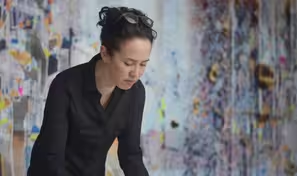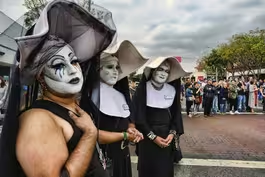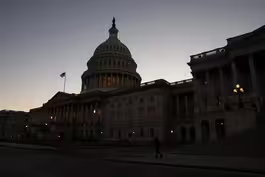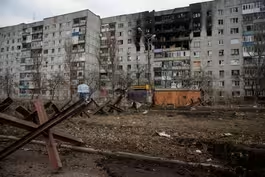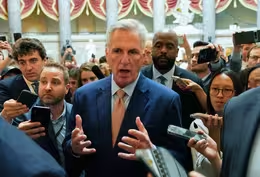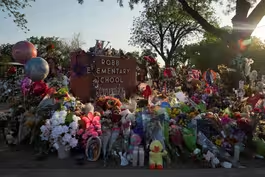
Black teachers counteract dropout rate among Black students
Clip: 5/23/2023 | 6m 40sVideo has Closed Captions
Organization mentors Black teachers to counteract dropout rate among Black students
In our series Rethinking College, we've put a particular emphasis on showing why it's crucial to build and diversify the teaching pipeline throughout a student's academic life and the impact it can have. Geoff Bennett reports on why developing and recruiting more Black teachers is especially important for Black students to make sure they go on and get their degrees.
Problems playing video? | Closed Captioning Feedback
Problems playing video? | Closed Captioning Feedback
Major corporate funding for the PBS News Hour is provided by BDO, BNSF, Consumer Cellular, American Cruise Lines, and Raymond James. Funding for the PBS NewsHour Weekend is provided by...

Black teachers counteract dropout rate among Black students
Clip: 5/23/2023 | 6m 40sVideo has Closed Captions
In our series Rethinking College, we've put a particular emphasis on showing why it's crucial to build and diversify the teaching pipeline throughout a student's academic life and the impact it can have. Geoff Bennett reports on why developing and recruiting more Black teachers is especially important for Black students to make sure they go on and get their degrees.
Problems playing video? | Closed Captioning Feedback
How to Watch PBS News Hour
PBS News Hour is available to stream on pbs.org and the free PBS App, available on iPhone, Apple TV, Android TV, Android smartphones, Amazon Fire TV, Amazon Fire Tablet, Roku, Samsung Smart TV, and Vizio.
Providing Support for PBS.org
Learn Moreabout PBS online sponsorshipWILLIAM BRANGHAM: In our series on higher education this spring, we have looked at why it's crucial to build out and diversify the teaching pipeline.
Tonight, we focus on why developing and recruiting more Black teachers is especially important for Black students, to make sure they continue their education and finish their degrees.
Geoff Bennett has the story for our series Rethinking College.
LEE DATTS, Teacher: All right, if you are in group six, you are coming to me now.
GEOFF BENNETT: Time for reading lessons in Lee Datts, second grade class at Mastery Prep Elementary in North Philadelphia.
LEE DATTS: Remember, read to comprehend.
Let me hear that again.
Read to comprehend.
STUDENTS: Read to comprehend.
GEOFF BENNETT: It's a common scene in classrooms across America, except for one key difference.
LEE DATTS: What did we talk about the last time I saw you all?
GEOFF BENNETT: The teacher.
SHARIF EL-MEKKI (Founder and CEO, Center for Black Educator Development): Nationally, there are less than 2 percent of all public school teachers are Black men.
GEOFF BENNETT: Sharif El-Mekki is the CEO of the Center for Black Educator Development.
He says teachers like Lee Datts are all too rare.
SHARIF EL-MEKKI: Even in places like Philadelphia that is extremely diverse and about half of the student population are Black, it hovers between 4 percent or 5 percent every year.
GEOFF BENNETT: And yet studies show, for young Black students, having a teacher who looks like them has huge long-term benefits.
CONSTANCE LINDSAY, University of North Carolina at Chapel Hill: Students in kindergarten and first grade, if they experience at least one Black teacher, they are less likely to drop out of high school and more likely to enroll in college.
GEOFF BENNETT: Constance Lindsay is an assistant professor at the UNC School of Education whose research focuses on educational equity.
What in your research has surprised you the most?
CONSTANCE LINDSAY: I think the outsize impact on Black boys.
Across several of our studies, we find that, many times, the results are driven by persistently low-income young Black boys.
So it's really important for them.
GEOFF BENNETT: So the stakes, she says, are highest in these classrooms where most students are Black and also come from economically disadvantaged families, especially for the boys.
SHARIF EL-MEKKI: Thirty-nine percent less likely to drop out of high school and up to 29 percent more likely to go to college if they have a single Black teacher.
Why isn't this the intervention that we're leading with?
What are you doing this summer?
GEOFF BENNETT: Sharif El-Sharif, a former principal and teacher himself, is on a mission.
SHARIF EL-MEKKI: You can go to WeNeedBlackteachers.com and just see.
We would love to have you.
It's a paid apprenticeship.
It's a job.
GEOFF BENNETT: El-Mekki's Center for Black Educator Development is building a Black teacher pipeline, one component, paid apprenticeships at Freedom Schools Literacy Academy, where high school and college students get hands-on teaching experience.
SHARIF EL-MEKKI: Don't go to McDonald's and Starbucks.
Come work here if you are interested in becoming a teacher.
This summer, we will have almost 200 Black and brown teacher apprentices working and leading hundreds of first, second and third graders.
JOSHUA MCQUEEN, Student: At first, I really didn't like kids.
GEOFF BENNETT: Teaching was not an obvious career path for high school junior Joshua McQueen.
JOSHUA MCQUEEN: I used to be scared of them, actually.
It was like -- because they made me so nervous because they have so much energy and stuff like that.
GEOFF BENNETT: But when McQueen apprenticed last summer, he says one student gave him a new perspective.
JOSHUA MCQUEEN: Like say if we went out to recess, I'd be playing tag with them and basketball with all of them.
He would be the one that was like constantly playing just because I was playing.
And it made me, like, realize the impact that I can have on a kid's life.
WOMAN: How can you even picture yourself in the shoes of excellence when you don't see yourself?
GEOFF BENNETT: McQueen is now taking a course his high school offers on the history and culture of Black teachers.
SHARIF EL-MEKKI: Often, when teachers are being prepared to teach, everything is centered in a white historical lens; 80 percent of our public schoolteachers are white.
And then they're sent into predominantly Black and brown classrooms.
GEOFF BENNETT: Imere Williams is an education major at West Chester University.
IMERE WILLIAMS, College Student: I have always wanted to be a teacher since I was 5 years old.
I have loved school my entire life.
I look at it as sort of a calling.
So, when you guys are writing your own sentences, I want your sentences to convey what that word means.
GEOFF BENNETT: Twice a week, Williams student-teaches fifth graders at James Rhoads School in the West Philadelphia neighborhood where he grew up.
IMERE WILLIAMS: I think that, a lot of times, people have misconceptions of West Philadelphia students or just urban students in general that they won't amount to much, they aren't scholars, they can't learn.
Well, I grew up in this neighborhood, and I'm in college.
I wanted to sort of just come back and prove that, like, students that come from urban schools can go on and do amazing, great things.
Who was described as obedient in the book?
GEOFF BENNETT: Williams receives scholarship money through the Black Teacher Pipeline to support his education.
Once he gets to five years of teaching, he will get a retention bonus.
What kind of impact do you think you have on your students?
IMERE WILLIAMS: I think they see me and they see someone that looks like them in a professional position.
They see that, like, I can do that one day.
Actually, one of my students, said, like: "I want to be like you, Mr. Williams one day."
And that sort of just like -- first, it melted my heart, but also sort of gave like even more fire to do this work, especially in a profession where so many doubts come with it, not a lot of pay, a lot of stress, a lot of duties, but things like that sort of, like, reel you back in.
GEOFF BENNETT: Constance Lindsay says educators like Williams are influential role models.
CONSTANCE LINDSAY: Seeing a college-educated Black person might sort of put a spark in you to attend college later on.
GEOFF BENNETT: Lindsay cites another reason Black instructors can be so impactful.
CONSTANCE LINDSAY: My colleagues actually have a study where they show that Black teachers, on average, expect Black students to go farther.
GEOFF BENNETT: That's the case with second grade teacher Trent Petty.
TRENT PETTY, Teacher: I always tell my kids you can be the one taking care of me in 10 years.
You can be my doctor, my lawyer, my mayor, my president.
LEE DATTS: The expectations are high because I believe in you.
GEOFF BENNETT: Lee Datts acknowledges his students tell him he is a lot, because he expects so much from them.
LEE DATTS: I always tell them, I'm looking for you to be an Ivy League student, because it's easy to just give up on a child.
It really is.
It is a natural thing to have a day where they're off-task and they're doing this, they're doing that, and they're Black and brown.
Or you can believe in them and believe in their dream and hope and desire and hold onto that.
What did Ruby Bridges have to deal with?
GEOFF BENNETT: Datts feels an obligation to teach his students about their shared history and culture.
LEE DATTS: What does segregation have to do with being bullied?
I don't understand.
In our classroom, anybody who we learn about that's African American, I really try to make it vocal to understand the importance of what they had to go through, like, understanding your background, understanding your history.
GEOFF BENNETT: I imagine all teachers feel a sense of responsibility.
I would also imagine that you feel that even more, given that you are a Black man in a school, predominantly Black school.
LEE DATTS: My natural responsibility is just to show what a Black and brown teacher looks like.
Like, if you never have another one, you know you had one.
GEOFF BENNETT: In the long run, that could make all the difference.
Artist uses architecture of Guggenheim in new installation
Video has Closed Captions
Clip: 5/23/2023 | 5m 49s | Artist Sarah Sze uses architecture of Guggenheim Museum as part of her new installation (5m 49s)
Dodgers re-invite drag group to Pride Night after backlash
Video has Closed Captions
Clip: 5/23/2023 | 7m 16s | Los Angeles Dodgers re-invite satirical drag group to Pride Night after backlash (7m 16s)
How the U.S. national debt reached $31.4 trillion
Video has Closed Captions
Clip: 5/23/2023 | 5m 43s | How the U.S. national debt reached $31.4 trillion (5m 43s)
The human toll of the battle for Bakhmut in eastern Ukraine
Video has Closed Captions
Clip: 5/23/2023 | 3m 46s | The human toll of the battle for Bakhmut in eastern Ukraine (3m 46s)
The potential impacts of the U.S. defaulting on its debt
Video has Closed Captions
Clip: 5/23/2023 | 6m 8s | Economist Mark Zandi on the potential impacts of the U.S. defaulting on its debt (6m 8s)
Tenuous ceasefire in Sudan offers some needed relief
Video has Closed Captions
Clip: 5/23/2023 | 5m 46s | Tenuous ceasefire in Sudan offers some needed relief after weeks of brutal fighting (5m 46s)
Uvalde still seeking accountability a year after shooting
Video has Closed Captions
Clip: 5/23/2023 | 5m 28s | Uvalde community still seeking accountability a year after elementary school shooting (5m 28s)
Providing Support for PBS.org
Learn Moreabout PBS online sponsorship
- News and Public Affairs

FRONTLINE is investigative journalism that questions, explains and changes our world.

- News and Public Affairs

Amanpour and Company features conversations with leaders and decision makers.












Support for PBS provided by:
Major corporate funding for the PBS News Hour is provided by BDO, BNSF, Consumer Cellular, American Cruise Lines, and Raymond James. Funding for the PBS NewsHour Weekend is provided by...
